Business Law Report: Analysis of UK Employment Law and EU Influence
VerifiedAdded on 2020/01/07
|11
|3455
|251
Report
AI Summary
This report provides a comprehensive analysis of UK business law, focusing on employment contracts and the influence of EU law. It begins by outlining the sources of employment contract terms, including common law, national statutes, EU law, and customs. The report then details the common law duties of both employees and employers, emphasizing obedience, fidelity, and the provision of a safe working environment. It further explores the Equality Act 2010, examining its scope, structure, protected characteristics, and the actions employers must take to ensure compliance, including non-discrimination policies and fair recruitment practices. Finally, the report addresses the impact of EU law on UK business, highlighting the main sources of EU law and its influence on businesses. The report provides a detailed overview of the legal framework governing employment relationships and the importance of compliance with both national and European legislation.
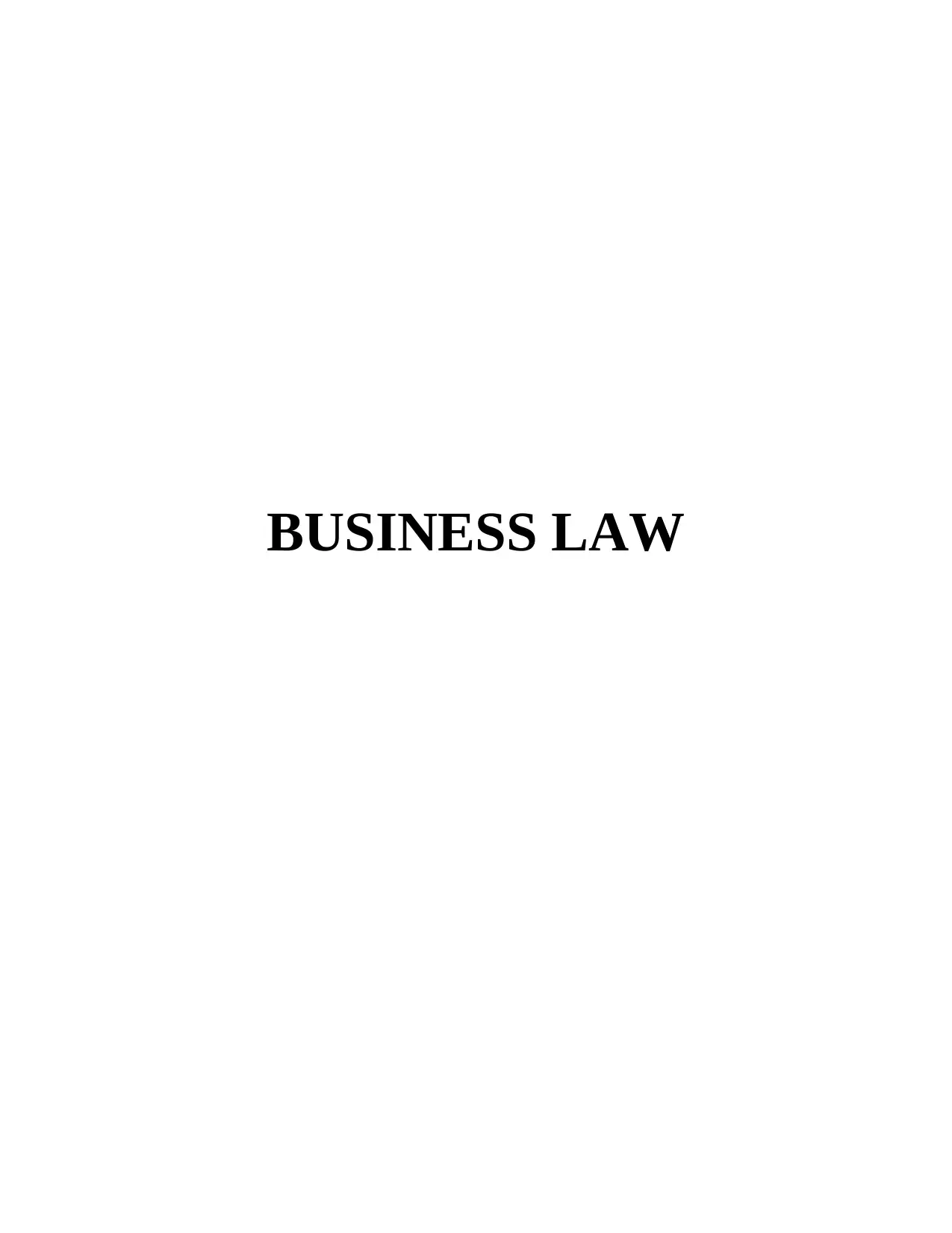
BUSINESS LAW
Paraphrase This Document
Need a fresh take? Get an instant paraphrase of this document with our AI Paraphraser
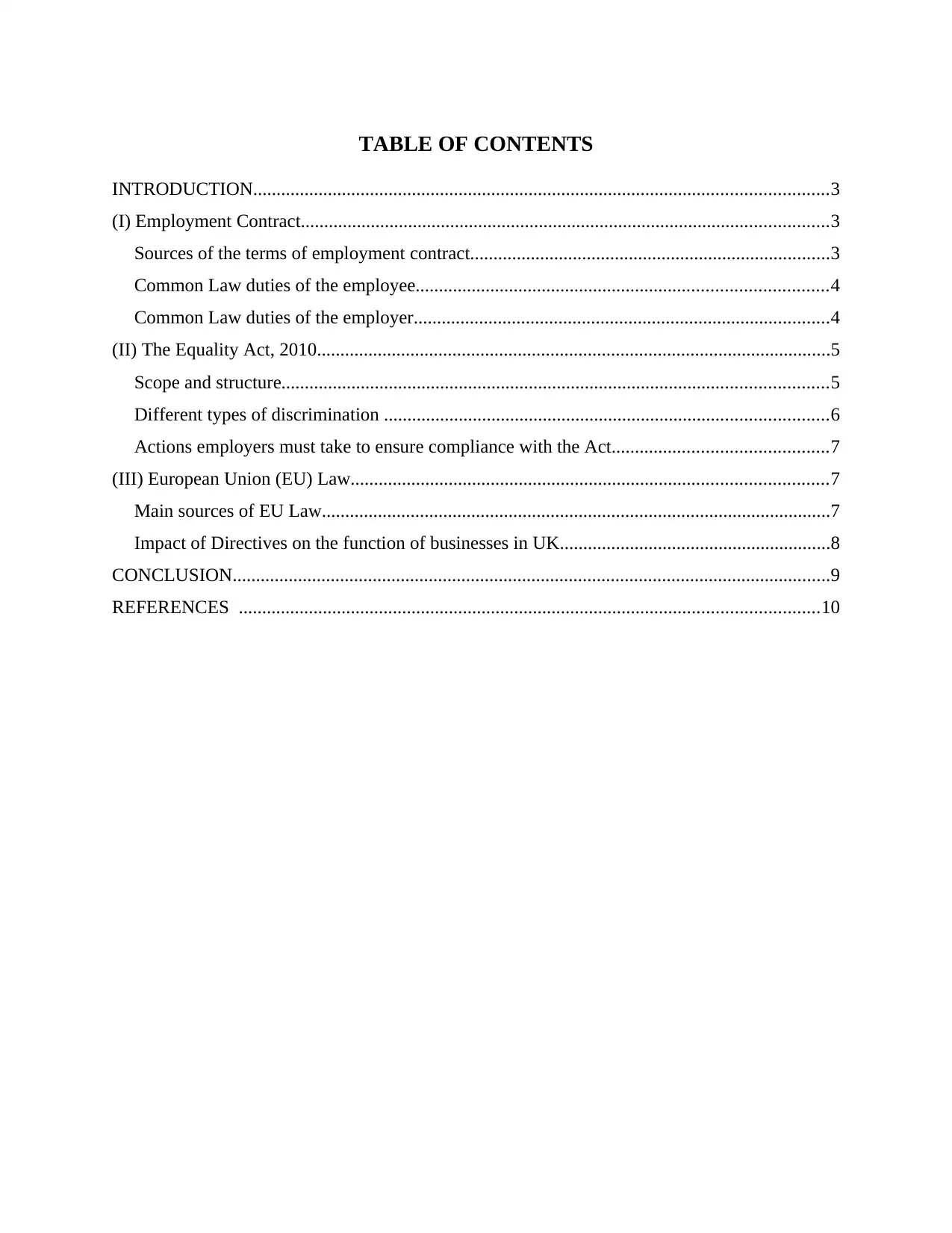
TABLE OF CONTENTS
INTRODUCTION...........................................................................................................................3
(I) Employment Contract.................................................................................................................3
Sources of the terms of employment contract.............................................................................3
Common Law duties of the employee........................................................................................4
Common Law duties of the employer.........................................................................................4
(II) The Equality Act, 2010..............................................................................................................5
Scope and structure.....................................................................................................................5
Different types of discrimination ...............................................................................................6
Actions employers must take to ensure compliance with the Act..............................................7
(III) European Union (EU) Law......................................................................................................7
Main sources of EU Law.............................................................................................................7
Impact of Directives on the function of businesses in UK..........................................................8
CONCLUSION................................................................................................................................9
REFERENCES ............................................................................................................................10
INTRODUCTION...........................................................................................................................3
(I) Employment Contract.................................................................................................................3
Sources of the terms of employment contract.............................................................................3
Common Law duties of the employee........................................................................................4
Common Law duties of the employer.........................................................................................4
(II) The Equality Act, 2010..............................................................................................................5
Scope and structure.....................................................................................................................5
Different types of discrimination ...............................................................................................6
Actions employers must take to ensure compliance with the Act..............................................7
(III) European Union (EU) Law......................................................................................................7
Main sources of EU Law.............................................................................................................7
Impact of Directives on the function of businesses in UK..........................................................8
CONCLUSION................................................................................................................................9
REFERENCES ............................................................................................................................10
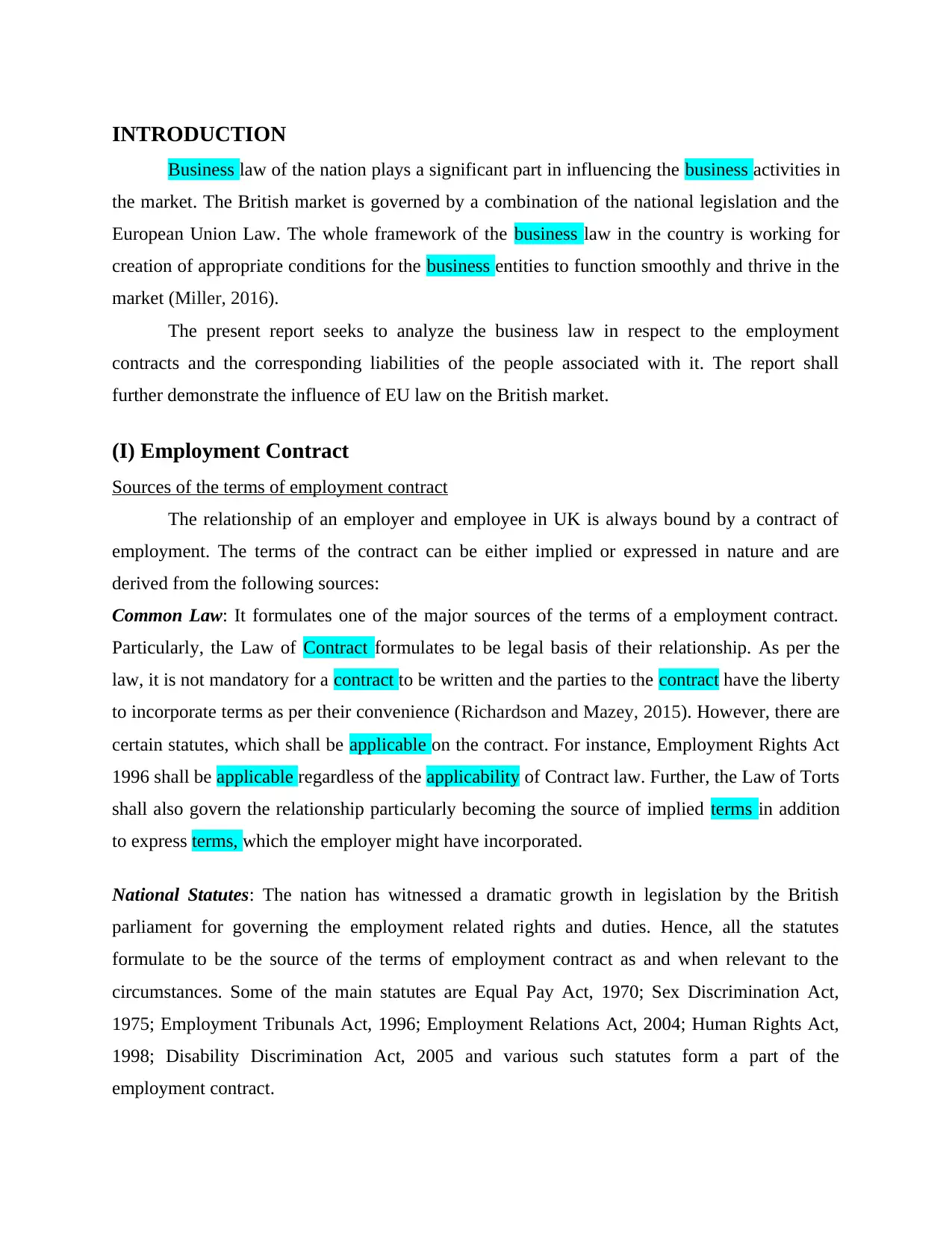
INTRODUCTION
Business law of the nation plays a significant part in influencing the business activities in
the market. The British market is governed by a combination of the national legislation and the
European Union Law. The whole framework of the business law in the country is working for
creation of appropriate conditions for the business entities to function smoothly and thrive in the
market (Miller, 2016).
The present report seeks to analyze the business law in respect to the employment
contracts and the corresponding liabilities of the people associated with it. The report shall
further demonstrate the influence of EU law on the British market.
(I) Employment Contract
Sources of the terms of employment contract
The relationship of an employer and employee in UK is always bound by a contract of
employment. The terms of the contract can be either implied or expressed in nature and are
derived from the following sources:
Common Law: It formulates one of the major sources of the terms of a employment contract.
Particularly, the Law of Contract formulates to be legal basis of their relationship. As per the
law, it is not mandatory for a contract to be written and the parties to the contract have the liberty
to incorporate terms as per their convenience (Richardson and Mazey, 2015). However, there are
certain statutes, which shall be applicable on the contract. For instance, Employment Rights Act
1996 shall be applicable regardless of the applicability of Contract law. Further, the Law of Torts
shall also govern the relationship particularly becoming the source of implied terms in addition
to express terms, which the employer might have incorporated.
National Statutes: The nation has witnessed a dramatic growth in legislation by the British
parliament for governing the employment related rights and duties. Hence, all the statutes
formulate to be the source of the terms of employment contract as and when relevant to the
circumstances. Some of the main statutes are Equal Pay Act, 1970; Sex Discrimination Act,
1975; Employment Tribunals Act, 1996; Employment Relations Act, 2004; Human Rights Act,
1998; Disability Discrimination Act, 2005 and various such statutes form a part of the
employment contract.
Business law of the nation plays a significant part in influencing the business activities in
the market. The British market is governed by a combination of the national legislation and the
European Union Law. The whole framework of the business law in the country is working for
creation of appropriate conditions for the business entities to function smoothly and thrive in the
market (Miller, 2016).
The present report seeks to analyze the business law in respect to the employment
contracts and the corresponding liabilities of the people associated with it. The report shall
further demonstrate the influence of EU law on the British market.
(I) Employment Contract
Sources of the terms of employment contract
The relationship of an employer and employee in UK is always bound by a contract of
employment. The terms of the contract can be either implied or expressed in nature and are
derived from the following sources:
Common Law: It formulates one of the major sources of the terms of a employment contract.
Particularly, the Law of Contract formulates to be legal basis of their relationship. As per the
law, it is not mandatory for a contract to be written and the parties to the contract have the liberty
to incorporate terms as per their convenience (Richardson and Mazey, 2015). However, there are
certain statutes, which shall be applicable on the contract. For instance, Employment Rights Act
1996 shall be applicable regardless of the applicability of Contract law. Further, the Law of Torts
shall also govern the relationship particularly becoming the source of implied terms in addition
to express terms, which the employer might have incorporated.
National Statutes: The nation has witnessed a dramatic growth in legislation by the British
parliament for governing the employment related rights and duties. Hence, all the statutes
formulate to be the source of the terms of employment contract as and when relevant to the
circumstances. Some of the main statutes are Equal Pay Act, 1970; Sex Discrimination Act,
1975; Employment Tribunals Act, 1996; Employment Relations Act, 2004; Human Rights Act,
1998; Disability Discrimination Act, 2005 and various such statutes form a part of the
employment contract.
⊘ This is a preview!⊘
Do you want full access?
Subscribe today to unlock all pages.

Trusted by 1+ million students worldwide
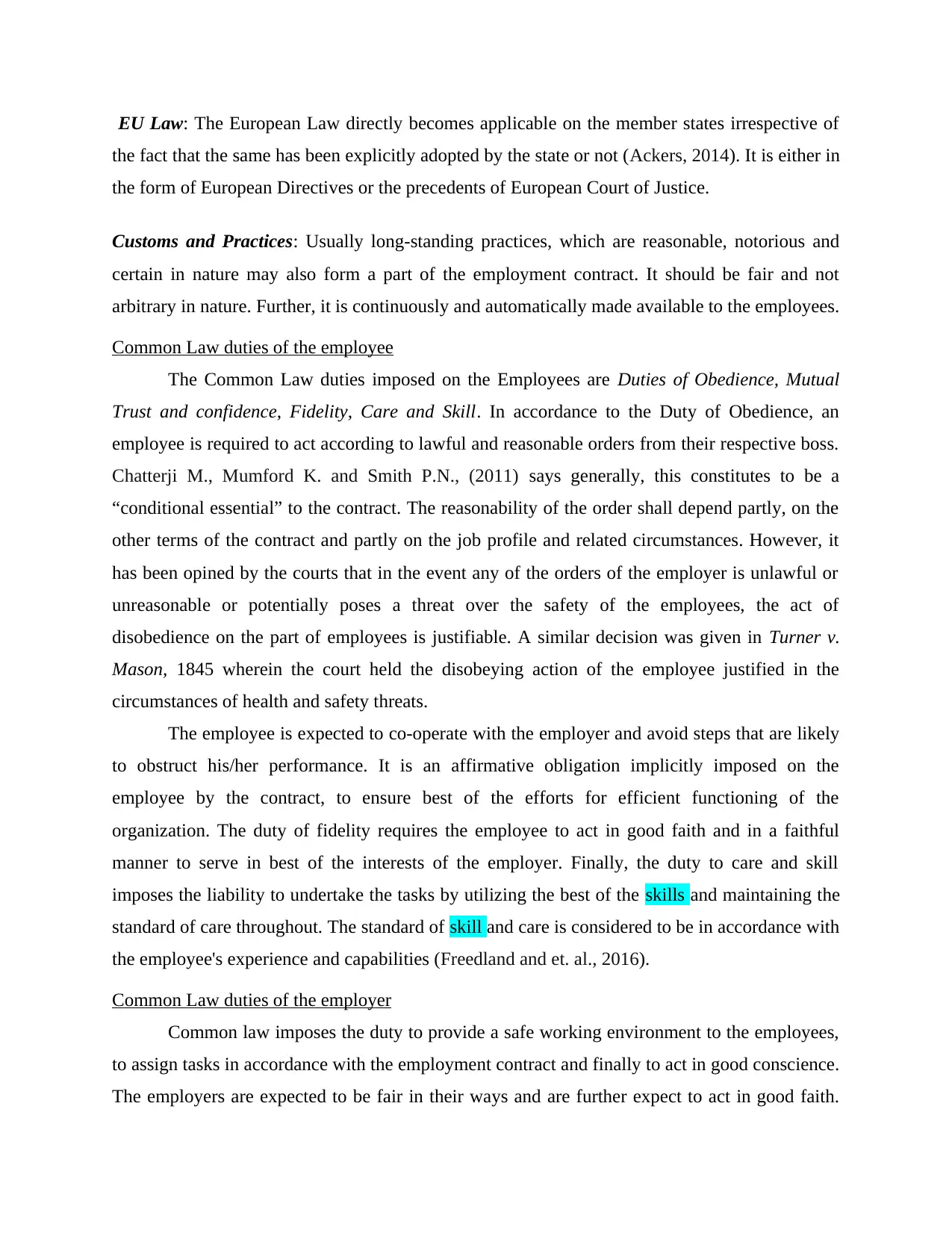
EU Law: The European Law directly becomes applicable on the member states irrespective of
the fact that the same has been explicitly adopted by the state or not (Ackers, 2014). It is either in
the form of European Directives or the precedents of European Court of Justice.
Customs and Practices: Usually long-standing practices, which are reasonable, notorious and
certain in nature may also form a part of the employment contract. It should be fair and not
arbitrary in nature. Further, it is continuously and automatically made available to the employees.
Common Law duties of the employee
The Common Law duties imposed on the Employees are Duties of Obedience, Mutual
Trust and confidence, Fidelity, Care and Skill. In accordance to the Duty of Obedience, an
employee is required to act according to lawful and reasonable orders from their respective boss.
Chatterji M., Mumford K. and Smith P.N., (2011) says generally, this constitutes to be a
“conditional essential” to the contract. The reasonability of the order shall depend partly, on the
other terms of the contract and partly on the job profile and related circumstances. However, it
has been opined by the courts that in the event any of the orders of the employer is unlawful or
unreasonable or potentially poses a threat over the safety of the employees, the act of
disobedience on the part of employees is justifiable. A similar decision was given in Turner v.
Mason, 1845 wherein the court held the disobeying action of the employee justified in the
circumstances of health and safety threats.
The employee is expected to co-operate with the employer and avoid steps that are likely
to obstruct his/her performance. It is an affirmative obligation implicitly imposed on the
employee by the contract, to ensure best of the efforts for efficient functioning of the
organization. The duty of fidelity requires the employee to act in good faith and in a faithful
manner to serve in best of the interests of the employer. Finally, the duty to care and skill
imposes the liability to undertake the tasks by utilizing the best of the skills and maintaining the
standard of care throughout. The standard of skill and care is considered to be in accordance with
the employee's experience and capabilities (Freedland and et. al., 2016).
Common Law duties of the employer
Common law imposes the duty to provide a safe working environment to the employees,
to assign tasks in accordance with the employment contract and finally to act in good conscience.
The employers are expected to be fair in their ways and are further expect to act in good faith.
the fact that the same has been explicitly adopted by the state or not (Ackers, 2014). It is either in
the form of European Directives or the precedents of European Court of Justice.
Customs and Practices: Usually long-standing practices, which are reasonable, notorious and
certain in nature may also form a part of the employment contract. It should be fair and not
arbitrary in nature. Further, it is continuously and automatically made available to the employees.
Common Law duties of the employee
The Common Law duties imposed on the Employees are Duties of Obedience, Mutual
Trust and confidence, Fidelity, Care and Skill. In accordance to the Duty of Obedience, an
employee is required to act according to lawful and reasonable orders from their respective boss.
Chatterji M., Mumford K. and Smith P.N., (2011) says generally, this constitutes to be a
“conditional essential” to the contract. The reasonability of the order shall depend partly, on the
other terms of the contract and partly on the job profile and related circumstances. However, it
has been opined by the courts that in the event any of the orders of the employer is unlawful or
unreasonable or potentially poses a threat over the safety of the employees, the act of
disobedience on the part of employees is justifiable. A similar decision was given in Turner v.
Mason, 1845 wherein the court held the disobeying action of the employee justified in the
circumstances of health and safety threats.
The employee is expected to co-operate with the employer and avoid steps that are likely
to obstruct his/her performance. It is an affirmative obligation implicitly imposed on the
employee by the contract, to ensure best of the efforts for efficient functioning of the
organization. The duty of fidelity requires the employee to act in good faith and in a faithful
manner to serve in best of the interests of the employer. Finally, the duty to care and skill
imposes the liability to undertake the tasks by utilizing the best of the skills and maintaining the
standard of care throughout. The standard of skill and care is considered to be in accordance with
the employee's experience and capabilities (Freedland and et. al., 2016).
Common Law duties of the employer
Common law imposes the duty to provide a safe working environment to the employees,
to assign tasks in accordance with the employment contract and finally to act in good conscience.
The employers are expected to be fair in their ways and are further expect to act in good faith.
Paraphrase This Document
Need a fresh take? Get an instant paraphrase of this document with our AI Paraphraser
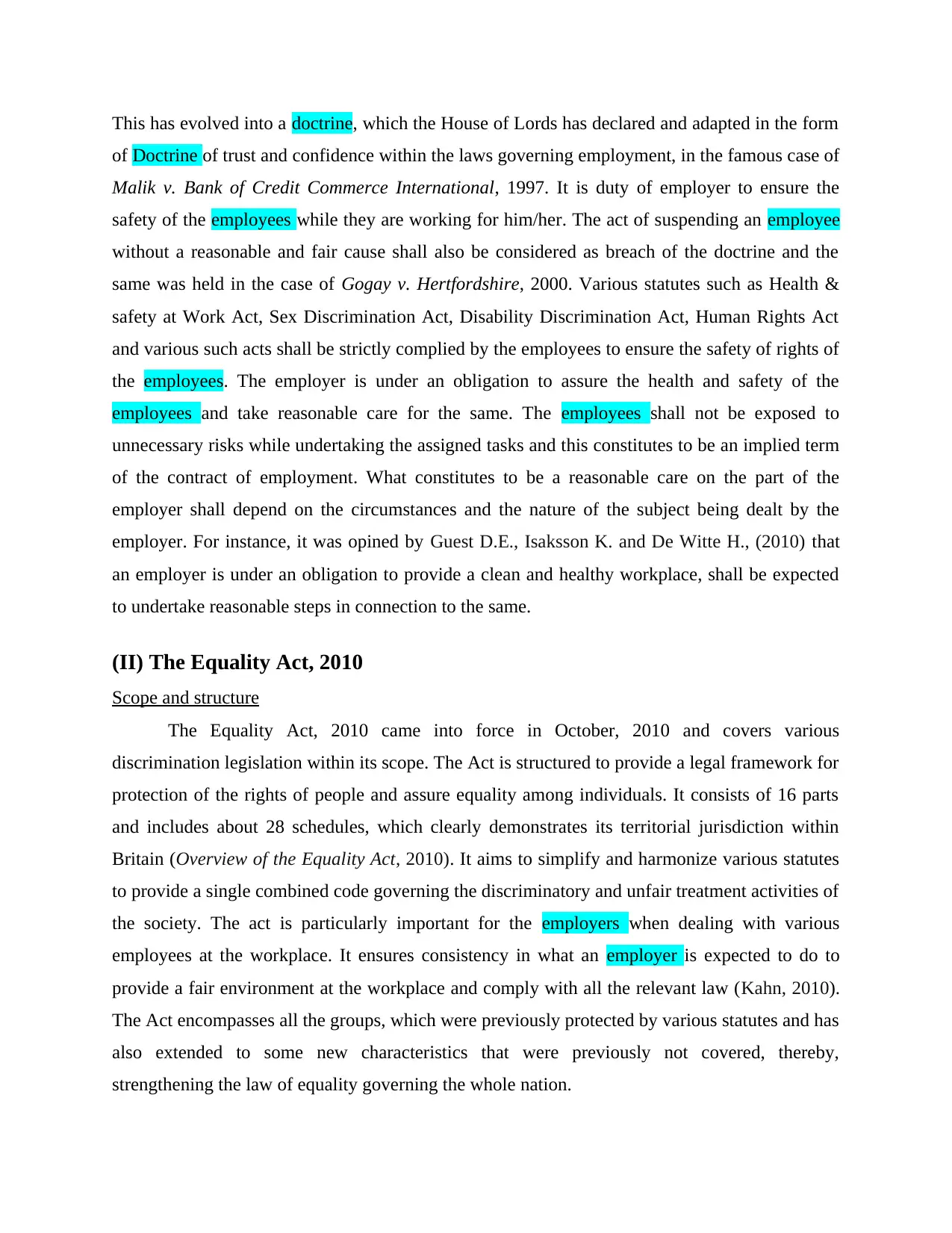
This has evolved into a doctrine, which the House of Lords has declared and adapted in the form
of Doctrine of trust and confidence within the laws governing employment, in the famous case of
Malik v. Bank of Credit Commerce International, 1997. It is duty of employer to ensure the
safety of the employees while they are working for him/her. The act of suspending an employee
without a reasonable and fair cause shall also be considered as breach of the doctrine and the
same was held in the case of Gogay v. Hertfordshire, 2000. Various statutes such as Health &
safety at Work Act, Sex Discrimination Act, Disability Discrimination Act, Human Rights Act
and various such acts shall be strictly complied by the employees to ensure the safety of rights of
the employees. The employer is under an obligation to assure the health and safety of the
employees and take reasonable care for the same. The employees shall not be exposed to
unnecessary risks while undertaking the assigned tasks and this constitutes to be an implied term
of the contract of employment. What constitutes to be a reasonable care on the part of the
employer shall depend on the circumstances and the nature of the subject being dealt by the
employer. For instance, it was opined by Guest D.E., Isaksson K. and De Witte H., (2010) that
an employer is under an obligation to provide a clean and healthy workplace, shall be expected
to undertake reasonable steps in connection to the same.
(II) The Equality Act, 2010
Scope and structure
The Equality Act, 2010 came into force in October, 2010 and covers various
discrimination legislation within its scope. The Act is structured to provide a legal framework for
protection of the rights of people and assure equality among individuals. It consists of 16 parts
and includes about 28 schedules, which clearly demonstrates its territorial jurisdiction within
Britain (Overview of the Equality Act, 2010). It aims to simplify and harmonize various statutes
to provide a single combined code governing the discriminatory and unfair treatment activities of
the society. The act is particularly important for the employers when dealing with various
employees at the workplace. It ensures consistency in what an employer is expected to do to
provide a fair environment at the workplace and comply with all the relevant law (Kahn, 2010).
The Act encompasses all the groups, which were previously protected by various statutes and has
also extended to some new characteristics that were previously not covered, thereby,
strengthening the law of equality governing the whole nation.
of Doctrine of trust and confidence within the laws governing employment, in the famous case of
Malik v. Bank of Credit Commerce International, 1997. It is duty of employer to ensure the
safety of the employees while they are working for him/her. The act of suspending an employee
without a reasonable and fair cause shall also be considered as breach of the doctrine and the
same was held in the case of Gogay v. Hertfordshire, 2000. Various statutes such as Health &
safety at Work Act, Sex Discrimination Act, Disability Discrimination Act, Human Rights Act
and various such acts shall be strictly complied by the employees to ensure the safety of rights of
the employees. The employer is under an obligation to assure the health and safety of the
employees and take reasonable care for the same. The employees shall not be exposed to
unnecessary risks while undertaking the assigned tasks and this constitutes to be an implied term
of the contract of employment. What constitutes to be a reasonable care on the part of the
employer shall depend on the circumstances and the nature of the subject being dealt by the
employer. For instance, it was opined by Guest D.E., Isaksson K. and De Witte H., (2010) that
an employer is under an obligation to provide a clean and healthy workplace, shall be expected
to undertake reasonable steps in connection to the same.
(II) The Equality Act, 2010
Scope and structure
The Equality Act, 2010 came into force in October, 2010 and covers various
discrimination legislation within its scope. The Act is structured to provide a legal framework for
protection of the rights of people and assure equality among individuals. It consists of 16 parts
and includes about 28 schedules, which clearly demonstrates its territorial jurisdiction within
Britain (Overview of the Equality Act, 2010). It aims to simplify and harmonize various statutes
to provide a single combined code governing the discriminatory and unfair treatment activities of
the society. The act is particularly important for the employers when dealing with various
employees at the workplace. It ensures consistency in what an employer is expected to do to
provide a fair environment at the workplace and comply with all the relevant law (Kahn, 2010).
The Act encompasses all the groups, which were previously protected by various statutes and has
also extended to some new characteristics that were previously not covered, thereby,
strengthening the law of equality governing the whole nation.
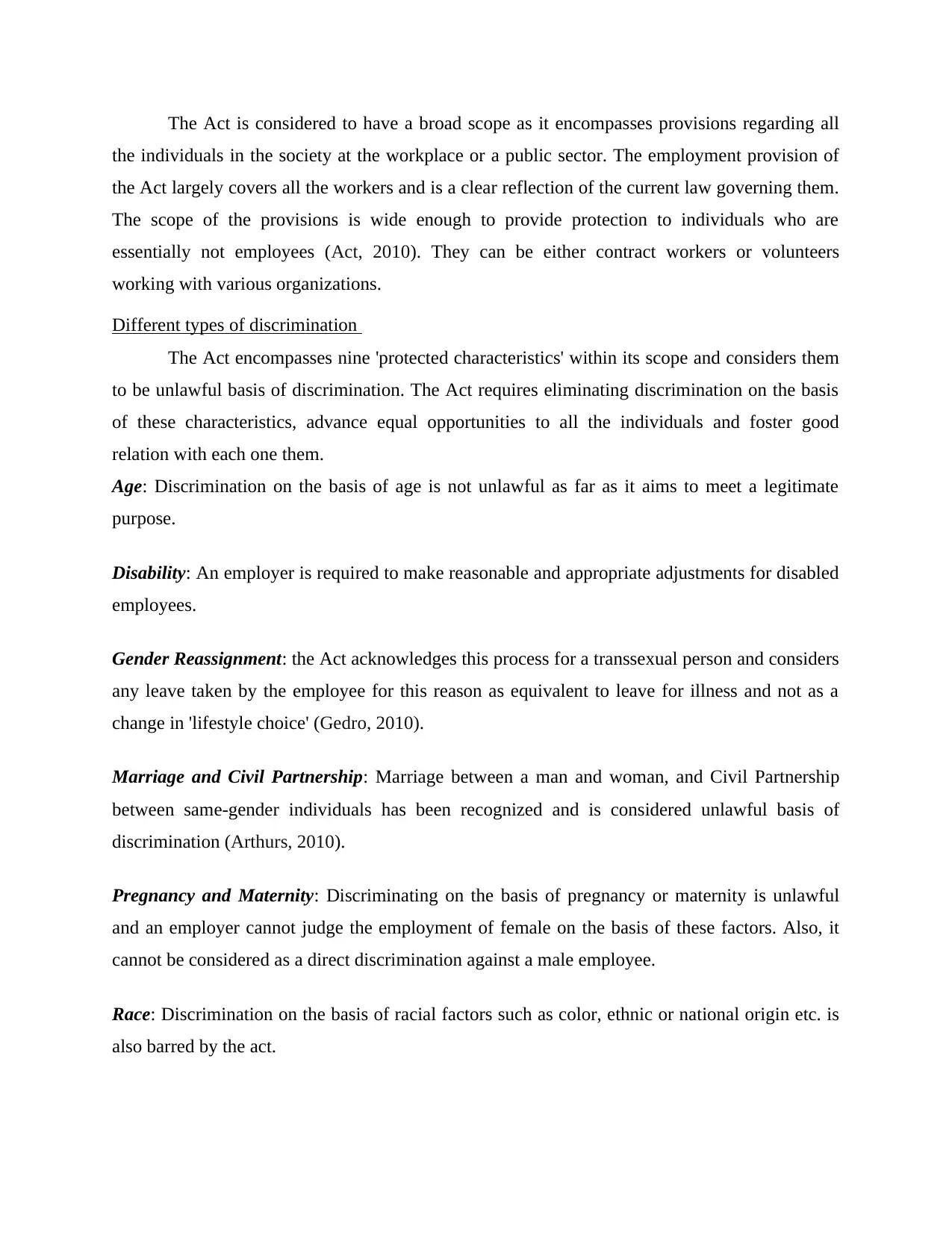
The Act is considered to have a broad scope as it encompasses provisions regarding all
the individuals in the society at the workplace or a public sector. The employment provision of
the Act largely covers all the workers and is a clear reflection of the current law governing them.
The scope of the provisions is wide enough to provide protection to individuals who are
essentially not employees (Act, 2010). They can be either contract workers or volunteers
working with various organizations.
Different types of discrimination
The Act encompasses nine 'protected characteristics' within its scope and considers them
to be unlawful basis of discrimination. The Act requires eliminating discrimination on the basis
of these characteristics, advance equal opportunities to all the individuals and foster good
relation with each one them.
Age: Discrimination on the basis of age is not unlawful as far as it aims to meet a legitimate
purpose.
Disability: An employer is required to make reasonable and appropriate adjustments for disabled
employees.
Gender Reassignment: the Act acknowledges this process for a transsexual person and considers
any leave taken by the employee for this reason as equivalent to leave for illness and not as a
change in 'lifestyle choice' (Gedro, 2010).
Marriage and Civil Partnership: Marriage between a man and woman, and Civil Partnership
between same-gender individuals has been recognized and is considered unlawful basis of
discrimination (Arthurs, 2010).
Pregnancy and Maternity: Discriminating on the basis of pregnancy or maternity is unlawful
and an employer cannot judge the employment of female on the basis of these factors. Also, it
cannot be considered as a direct discrimination against a male employee.
Race: Discrimination on the basis of racial factors such as color, ethnic or national origin etc. is
also barred by the act.
the individuals in the society at the workplace or a public sector. The employment provision of
the Act largely covers all the workers and is a clear reflection of the current law governing them.
The scope of the provisions is wide enough to provide protection to individuals who are
essentially not employees (Act, 2010). They can be either contract workers or volunteers
working with various organizations.
Different types of discrimination
The Act encompasses nine 'protected characteristics' within its scope and considers them
to be unlawful basis of discrimination. The Act requires eliminating discrimination on the basis
of these characteristics, advance equal opportunities to all the individuals and foster good
relation with each one them.
Age: Discrimination on the basis of age is not unlawful as far as it aims to meet a legitimate
purpose.
Disability: An employer is required to make reasonable and appropriate adjustments for disabled
employees.
Gender Reassignment: the Act acknowledges this process for a transsexual person and considers
any leave taken by the employee for this reason as equivalent to leave for illness and not as a
change in 'lifestyle choice' (Gedro, 2010).
Marriage and Civil Partnership: Marriage between a man and woman, and Civil Partnership
between same-gender individuals has been recognized and is considered unlawful basis of
discrimination (Arthurs, 2010).
Pregnancy and Maternity: Discriminating on the basis of pregnancy or maternity is unlawful
and an employer cannot judge the employment of female on the basis of these factors. Also, it
cannot be considered as a direct discrimination against a male employee.
Race: Discrimination on the basis of racial factors such as color, ethnic or national origin etc. is
also barred by the act.
⊘ This is a preview!⊘
Do you want full access?
Subscribe today to unlock all pages.

Trusted by 1+ million students worldwide
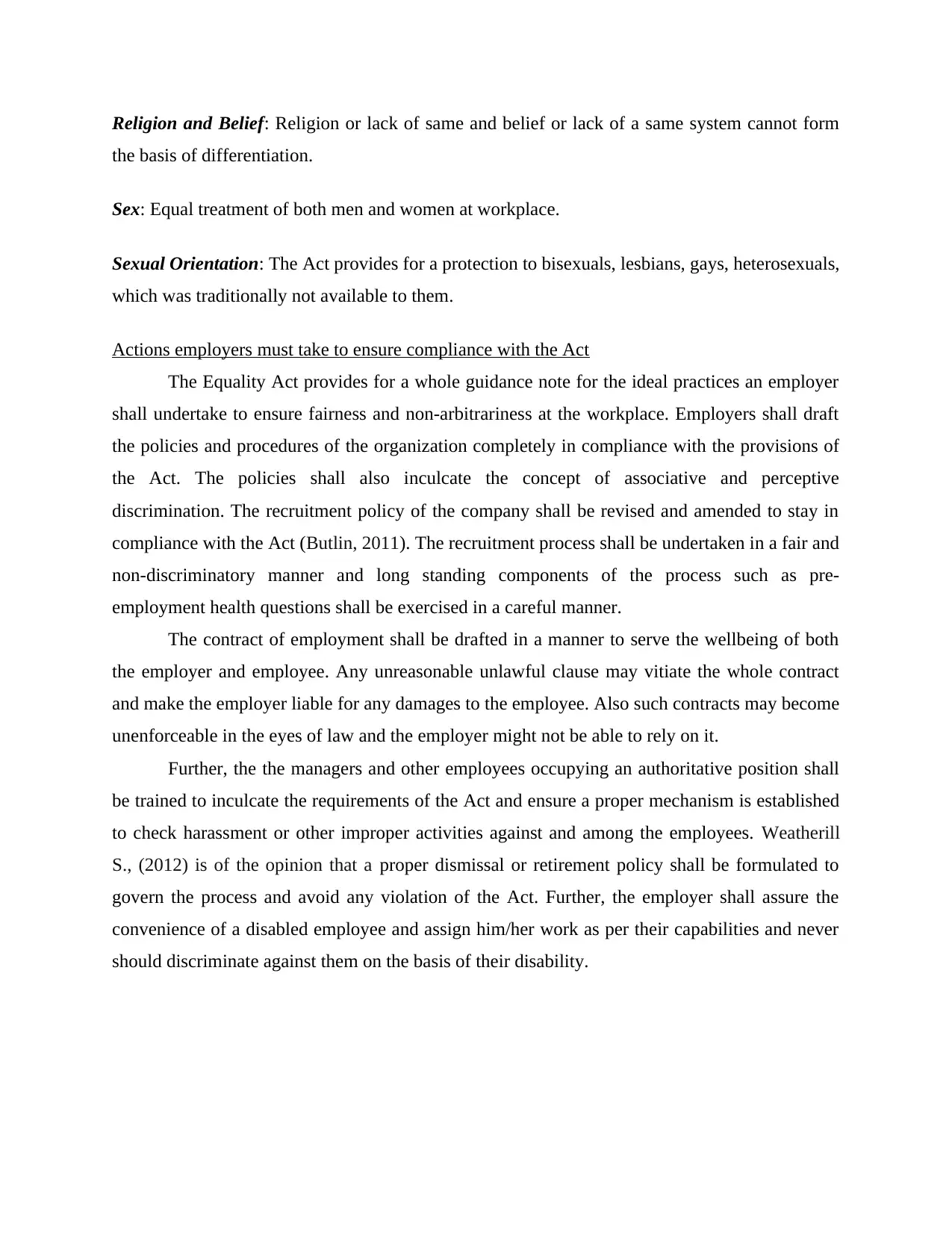
Religion and Belief: Religion or lack of same and belief or lack of a same system cannot form
the basis of differentiation.
Sex: Equal treatment of both men and women at workplace.
Sexual Orientation: The Act provides for a protection to bisexuals, lesbians, gays, heterosexuals,
which was traditionally not available to them.
Actions employers must take to ensure compliance with the Act
The Equality Act provides for a whole guidance note for the ideal practices an employer
shall undertake to ensure fairness and non-arbitrariness at the workplace. Employers shall draft
the policies and procedures of the organization completely in compliance with the provisions of
the Act. The policies shall also inculcate the concept of associative and perceptive
discrimination. The recruitment policy of the company shall be revised and amended to stay in
compliance with the Act (Butlin, 2011). The recruitment process shall be undertaken in a fair and
non-discriminatory manner and long standing components of the process such as pre-
employment health questions shall be exercised in a careful manner.
The contract of employment shall be drafted in a manner to serve the wellbeing of both
the employer and employee. Any unreasonable unlawful clause may vitiate the whole contract
and make the employer liable for any damages to the employee. Also such contracts may become
unenforceable in the eyes of law and the employer might not be able to rely on it.
Further, the the managers and other employees occupying an authoritative position shall
be trained to inculcate the requirements of the Act and ensure a proper mechanism is established
to check harassment or other improper activities against and among the employees. Weatherill
S., (2012) is of the opinion that a proper dismissal or retirement policy shall be formulated to
govern the process and avoid any violation of the Act. Further, the employer shall assure the
convenience of a disabled employee and assign him/her work as per their capabilities and never
should discriminate against them on the basis of their disability.
the basis of differentiation.
Sex: Equal treatment of both men and women at workplace.
Sexual Orientation: The Act provides for a protection to bisexuals, lesbians, gays, heterosexuals,
which was traditionally not available to them.
Actions employers must take to ensure compliance with the Act
The Equality Act provides for a whole guidance note for the ideal practices an employer
shall undertake to ensure fairness and non-arbitrariness at the workplace. Employers shall draft
the policies and procedures of the organization completely in compliance with the provisions of
the Act. The policies shall also inculcate the concept of associative and perceptive
discrimination. The recruitment policy of the company shall be revised and amended to stay in
compliance with the Act (Butlin, 2011). The recruitment process shall be undertaken in a fair and
non-discriminatory manner and long standing components of the process such as pre-
employment health questions shall be exercised in a careful manner.
The contract of employment shall be drafted in a manner to serve the wellbeing of both
the employer and employee. Any unreasonable unlawful clause may vitiate the whole contract
and make the employer liable for any damages to the employee. Also such contracts may become
unenforceable in the eyes of law and the employer might not be able to rely on it.
Further, the the managers and other employees occupying an authoritative position shall
be trained to inculcate the requirements of the Act and ensure a proper mechanism is established
to check harassment or other improper activities against and among the employees. Weatherill
S., (2012) is of the opinion that a proper dismissal or retirement policy shall be formulated to
govern the process and avoid any violation of the Act. Further, the employer shall assure the
convenience of a disabled employee and assign him/her work as per their capabilities and never
should discriminate against them on the basis of their disability.
Paraphrase This Document
Need a fresh take? Get an instant paraphrase of this document with our AI Paraphraser
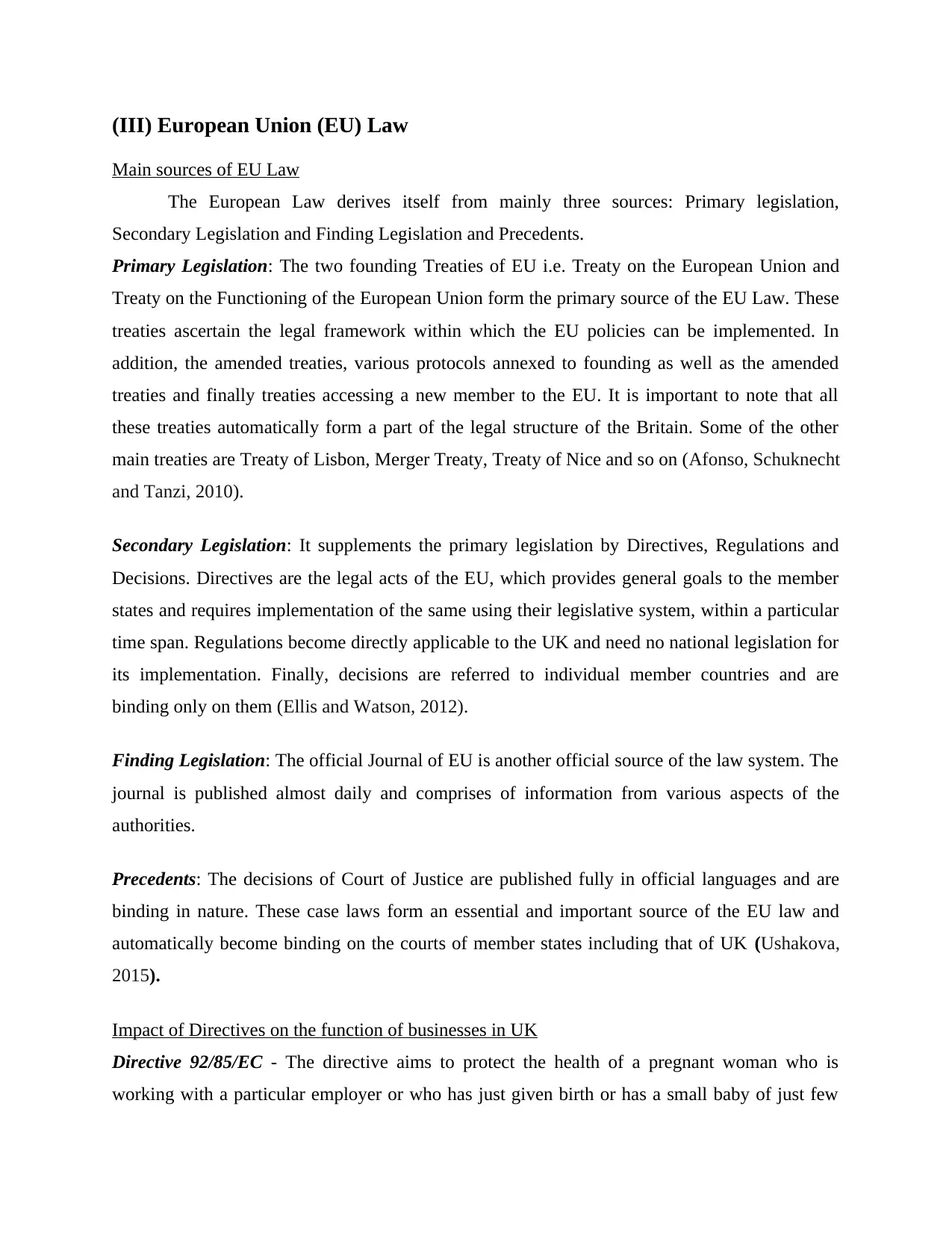
(III) European Union (EU) Law
Main sources of EU Law
The European Law derives itself from mainly three sources: Primary legislation,
Secondary Legislation and Finding Legislation and Precedents.
Primary Legislation: The two founding Treaties of EU i.e. Treaty on the European Union and
Treaty on the Functioning of the European Union form the primary source of the EU Law. These
treaties ascertain the legal framework within which the EU policies can be implemented. In
addition, the amended treaties, various protocols annexed to founding as well as the amended
treaties and finally treaties accessing a new member to the EU. It is important to note that all
these treaties automatically form a part of the legal structure of the Britain. Some of the other
main treaties are Treaty of Lisbon, Merger Treaty, Treaty of Nice and so on (Afonso, Schuknecht
and Tanzi, 2010).
Secondary Legislation: It supplements the primary legislation by Directives, Regulations and
Decisions. Directives are the legal acts of the EU, which provides general goals to the member
states and requires implementation of the same using their legislative system, within a particular
time span. Regulations become directly applicable to the UK and need no national legislation for
its implementation. Finally, decisions are referred to individual member countries and are
binding only on them (Ellis and Watson, 2012).
Finding Legislation: The official Journal of EU is another official source of the law system. The
journal is published almost daily and comprises of information from various aspects of the
authorities.
Precedents: The decisions of Court of Justice are published fully in official languages and are
binding in nature. These case laws form an essential and important source of the EU law and
automatically become binding on the courts of member states including that of UK (Ushakova,
2015).
Impact of Directives on the function of businesses in UK
Directive 92/85/EC - The directive aims to protect the health of a pregnant woman who is
working with a particular employer or who has just given birth or has a small baby of just few
Main sources of EU Law
The European Law derives itself from mainly three sources: Primary legislation,
Secondary Legislation and Finding Legislation and Precedents.
Primary Legislation: The two founding Treaties of EU i.e. Treaty on the European Union and
Treaty on the Functioning of the European Union form the primary source of the EU Law. These
treaties ascertain the legal framework within which the EU policies can be implemented. In
addition, the amended treaties, various protocols annexed to founding as well as the amended
treaties and finally treaties accessing a new member to the EU. It is important to note that all
these treaties automatically form a part of the legal structure of the Britain. Some of the other
main treaties are Treaty of Lisbon, Merger Treaty, Treaty of Nice and so on (Afonso, Schuknecht
and Tanzi, 2010).
Secondary Legislation: It supplements the primary legislation by Directives, Regulations and
Decisions. Directives are the legal acts of the EU, which provides general goals to the member
states and requires implementation of the same using their legislative system, within a particular
time span. Regulations become directly applicable to the UK and need no national legislation for
its implementation. Finally, decisions are referred to individual member countries and are
binding only on them (Ellis and Watson, 2012).
Finding Legislation: The official Journal of EU is another official source of the law system. The
journal is published almost daily and comprises of information from various aspects of the
authorities.
Precedents: The decisions of Court of Justice are published fully in official languages and are
binding in nature. These case laws form an essential and important source of the EU law and
automatically become binding on the courts of member states including that of UK (Ushakova,
2015).
Impact of Directives on the function of businesses in UK
Directive 92/85/EC - The directive aims to protect the health of a pregnant woman who is
working with a particular employer or who has just given birth or has a small baby of just few
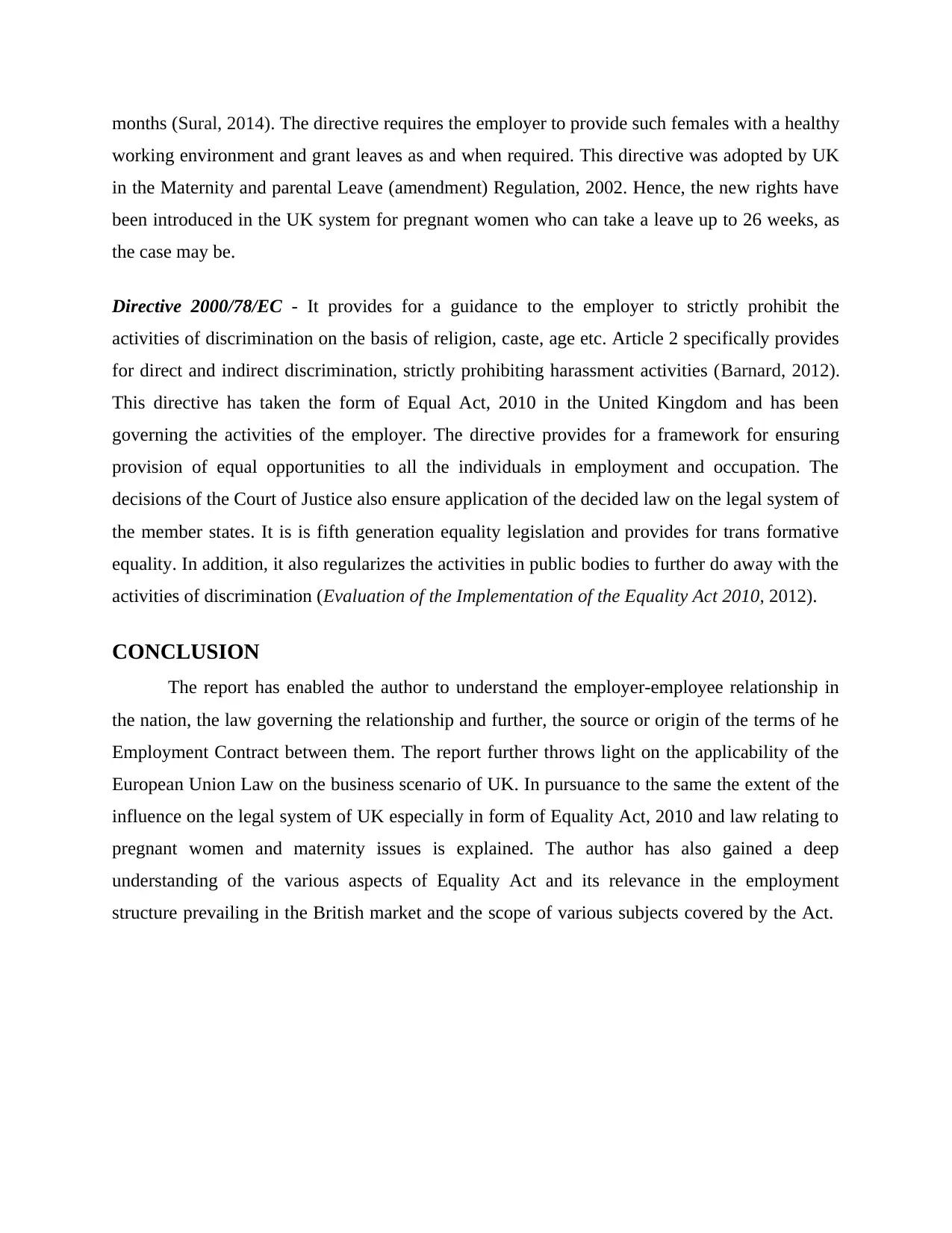
months (Sural, 2014). The directive requires the employer to provide such females with a healthy
working environment and grant leaves as and when required. This directive was adopted by UK
in the Maternity and parental Leave (amendment) Regulation, 2002. Hence, the new rights have
been introduced in the UK system for pregnant women who can take a leave up to 26 weeks, as
the case may be.
Directive 2000/78/EC - It provides for a guidance to the employer to strictly prohibit the
activities of discrimination on the basis of religion, caste, age etc. Article 2 specifically provides
for direct and indirect discrimination, strictly prohibiting harassment activities (Barnard, 2012).
This directive has taken the form of Equal Act, 2010 in the United Kingdom and has been
governing the activities of the employer. The directive provides for a framework for ensuring
provision of equal opportunities to all the individuals in employment and occupation. The
decisions of the Court of Justice also ensure application of the decided law on the legal system of
the member states. It is is fifth generation equality legislation and provides for trans formative
equality. In addition, it also regularizes the activities in public bodies to further do away with the
activities of discrimination (Evaluation of the Implementation of the Equality Act 2010, 2012).
CONCLUSION
The report has enabled the author to understand the employer-employee relationship in
the nation, the law governing the relationship and further, the source or origin of the terms of he
Employment Contract between them. The report further throws light on the applicability of the
European Union Law on the business scenario of UK. In pursuance to the same the extent of the
influence on the legal system of UK especially in form of Equality Act, 2010 and law relating to
pregnant women and maternity issues is explained. The author has also gained a deep
understanding of the various aspects of Equality Act and its relevance in the employment
structure prevailing in the British market and the scope of various subjects covered by the Act.
working environment and grant leaves as and when required. This directive was adopted by UK
in the Maternity and parental Leave (amendment) Regulation, 2002. Hence, the new rights have
been introduced in the UK system for pregnant women who can take a leave up to 26 weeks, as
the case may be.
Directive 2000/78/EC - It provides for a guidance to the employer to strictly prohibit the
activities of discrimination on the basis of religion, caste, age etc. Article 2 specifically provides
for direct and indirect discrimination, strictly prohibiting harassment activities (Barnard, 2012).
This directive has taken the form of Equal Act, 2010 in the United Kingdom and has been
governing the activities of the employer. The directive provides for a framework for ensuring
provision of equal opportunities to all the individuals in employment and occupation. The
decisions of the Court of Justice also ensure application of the decided law on the legal system of
the member states. It is is fifth generation equality legislation and provides for trans formative
equality. In addition, it also regularizes the activities in public bodies to further do away with the
activities of discrimination (Evaluation of the Implementation of the Equality Act 2010, 2012).
CONCLUSION
The report has enabled the author to understand the employer-employee relationship in
the nation, the law governing the relationship and further, the source or origin of the terms of he
Employment Contract between them. The report further throws light on the applicability of the
European Union Law on the business scenario of UK. In pursuance to the same the extent of the
influence on the legal system of UK especially in form of Equality Act, 2010 and law relating to
pregnant women and maternity issues is explained. The author has also gained a deep
understanding of the various aspects of Equality Act and its relevance in the employment
structure prevailing in the British market and the scope of various subjects covered by the Act.
⊘ This is a preview!⊘
Do you want full access?
Subscribe today to unlock all pages.

Trusted by 1+ million students worldwide
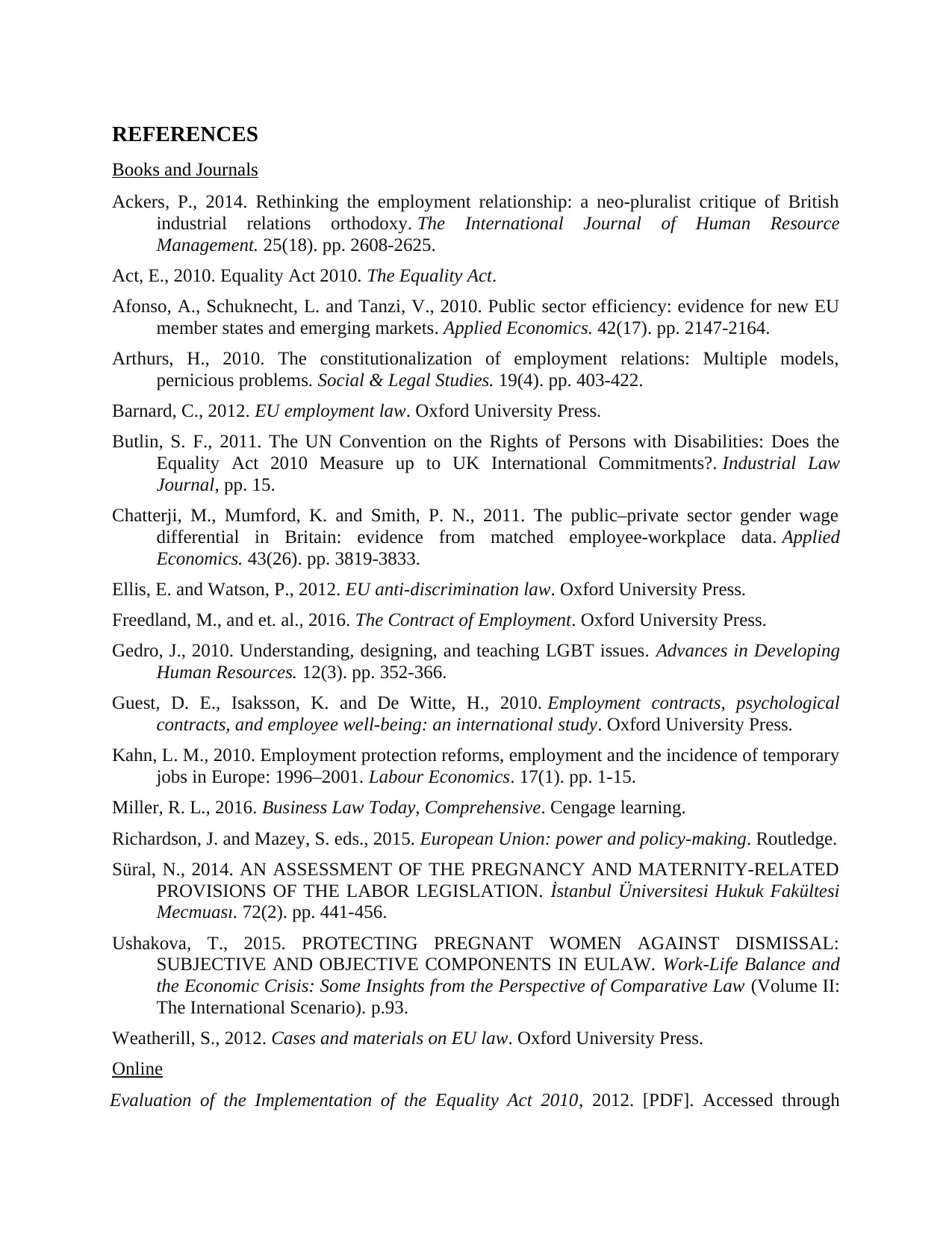
REFERENCES
Books and Journals
Ackers, P., 2014. Rethinking the employment relationship: a neo-pluralist critique of British
industrial relations orthodoxy. The International Journal of Human Resource
Management. 25(18). pp. 2608-2625.
Act, E., 2010. Equality Act 2010. The Equality Act.
Afonso, A., Schuknecht, L. and Tanzi, V., 2010. Public sector efficiency: evidence for new EU
member states and emerging markets. Applied Economics. 42(17). pp. 2147-2164.
Arthurs, H., 2010. The constitutionalization of employment relations: Multiple models,
pernicious problems. Social & Legal Studies. 19(4). pp. 403-422.
Barnard, C., 2012. EU employment law. Oxford University Press.
Butlin, S. F., 2011. The UN Convention on the Rights of Persons with Disabilities: Does the
Equality Act 2010 Measure up to UK International Commitments?. Industrial Law
Journal, pp. 15.
Chatterji, M., Mumford, K. and Smith, P. N., 2011. The public–private sector gender wage
differential in Britain: evidence from matched employee-workplace data. Applied
Economics. 43(26). pp. 3819-3833.
Ellis, E. and Watson, P., 2012. EU anti-discrimination law. Oxford University Press.
Freedland, M., and et. al., 2016. The Contract of Employment. Oxford University Press.
Gedro, J., 2010. Understanding, designing, and teaching LGBT issues. Advances in Developing
Human Resources. 12(3). pp. 352-366.
Guest, D. E., Isaksson, K. and De Witte, H., 2010. Employment contracts, psychological
contracts, and employee well-being: an international study. Oxford University Press.
Kahn, L. M., 2010. Employment protection reforms, employment and the incidence of temporary
jobs in Europe: 1996–2001. Labour Economics. 17(1). pp. 1-15.
Miller, R. L., 2016. Business Law Today, Comprehensive. Cengage learning.
Richardson, J. and Mazey, S. eds., 2015. European Union: power and policy-making. Routledge.
Süral, N., 2014. AN ASSESSMENT OF THE PREGNANCY AND MATERNITY-RELATED
PROVISIONS OF THE LABOR LEGISLATION. İstanbul Üniversitesi Hukuk Fakültesi
Mecmuası. 72(2). pp. 441-456.
Ushakova, T., 2015. PROTECTING PREGNANT WOMEN AGAINST DISMISSAL:
SUBJECTIVE AND OBJECTIVE COMPONENTS IN EULAW. Work-Life Balance and
the Economic Crisis: Some Insights from the Perspective of Comparative Law (Volume II:
The International Scenario). p.93.
Weatherill, S., 2012. Cases and materials on EU law. Oxford University Press.
Online
Evaluation of the Implementation of the Equality Act 2010, 2012. [PDF]. Accessed through
Books and Journals
Ackers, P., 2014. Rethinking the employment relationship: a neo-pluralist critique of British
industrial relations orthodoxy. The International Journal of Human Resource
Management. 25(18). pp. 2608-2625.
Act, E., 2010. Equality Act 2010. The Equality Act.
Afonso, A., Schuknecht, L. and Tanzi, V., 2010. Public sector efficiency: evidence for new EU
member states and emerging markets. Applied Economics. 42(17). pp. 2147-2164.
Arthurs, H., 2010. The constitutionalization of employment relations: Multiple models,
pernicious problems. Social & Legal Studies. 19(4). pp. 403-422.
Barnard, C., 2012. EU employment law. Oxford University Press.
Butlin, S. F., 2011. The UN Convention on the Rights of Persons with Disabilities: Does the
Equality Act 2010 Measure up to UK International Commitments?. Industrial Law
Journal, pp. 15.
Chatterji, M., Mumford, K. and Smith, P. N., 2011. The public–private sector gender wage
differential in Britain: evidence from matched employee-workplace data. Applied
Economics. 43(26). pp. 3819-3833.
Ellis, E. and Watson, P., 2012. EU anti-discrimination law. Oxford University Press.
Freedland, M., and et. al., 2016. The Contract of Employment. Oxford University Press.
Gedro, J., 2010. Understanding, designing, and teaching LGBT issues. Advances in Developing
Human Resources. 12(3). pp. 352-366.
Guest, D. E., Isaksson, K. and De Witte, H., 2010. Employment contracts, psychological
contracts, and employee well-being: an international study. Oxford University Press.
Kahn, L. M., 2010. Employment protection reforms, employment and the incidence of temporary
jobs in Europe: 1996–2001. Labour Economics. 17(1). pp. 1-15.
Miller, R. L., 2016. Business Law Today, Comprehensive. Cengage learning.
Richardson, J. and Mazey, S. eds., 2015. European Union: power and policy-making. Routledge.
Süral, N., 2014. AN ASSESSMENT OF THE PREGNANCY AND MATERNITY-RELATED
PROVISIONS OF THE LABOR LEGISLATION. İstanbul Üniversitesi Hukuk Fakültesi
Mecmuası. 72(2). pp. 441-456.
Ushakova, T., 2015. PROTECTING PREGNANT WOMEN AGAINST DISMISSAL:
SUBJECTIVE AND OBJECTIVE COMPONENTS IN EULAW. Work-Life Balance and
the Economic Crisis: Some Insights from the Perspective of Comparative Law (Volume II:
The International Scenario). p.93.
Weatherill, S., 2012. Cases and materials on EU law. Oxford University Press.
Online
Evaluation of the Implementation of the Equality Act 2010, 2012. [PDF]. Accessed through
Paraphrase This Document
Need a fresh take? Get an instant paraphrase of this document with our AI Paraphraser

<https://www.gov.uk/government/uploads/system/uploads/attachment_data/file/78434/
Eval_of_Equality_Act_Report2.PDF> [Accessed on 6th August, 2016].
Overview of the Equality Act, 2010. [PDF]. Accessed through
<http://www.bristol.ac.uk/equalityanddiversity/act/overview.pdf> [Accessed on 6th
August, 2016].
Eval_of_Equality_Act_Report2.PDF> [Accessed on 6th August, 2016].
Overview of the Equality Act, 2010. [PDF]. Accessed through
<http://www.bristol.ac.uk/equalityanddiversity/act/overview.pdf> [Accessed on 6th
August, 2016].
1 out of 11
Related Documents
Your All-in-One AI-Powered Toolkit for Academic Success.
+13062052269
info@desklib.com
Available 24*7 on WhatsApp / Email
![[object Object]](/_next/static/media/star-bottom.7253800d.svg)
Unlock your academic potential
Copyright © 2020–2026 A2Z Services. All Rights Reserved. Developed and managed by ZUCOL.





